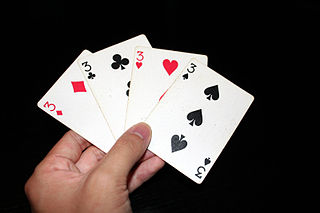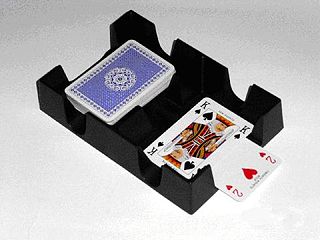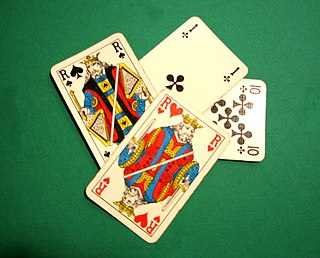
Pinochle, formerly pinocle, or penuchle, is a trick-taking, Ace-Ten card game typically for two to four players and played with a 48-card deck. It is derived from the card game bezique; players score points by trick-taking and also by forming combinations of cards into melds. It is thus considered part of a "trick-and-meld" category which also includes the game belote. Each hand is played in three phases: bidding, melds, and tricks. The standard game today is called "partnership auction pinochle."

Tarocchini are point trick-taking tarot card games originating from the 17th century. They are the diminutive form of tarocchi, referring to the reduction of the Bolognese pack from 78 to 62 cards, which probably occurred in the early 16th century.

Gin rummy, or simply gin, is a two-player card game created in 1909 by Elwood T. Baker and his son C. Graham Baker. It is a variant of rummy.

Bezique or Bésigue is a 19th-century French melding and trick-taking card game for two players. The game is derived from Piquet, possibly via Marriage (Sixty-six) and Briscan, with additional scoring features, notably the peculiar liaison of the Q♠ and J♦ that is also a feature of Pinochle, Binokel, and similarly named games that vary by country.

Canasta is a card game of the rummy family of games believed to be a variant of 500 Rum. Although many variations exist for two, three, five or six players, it is most commonly played by four in two partnerships with two standard decks of cards. Players attempt to make melds of seven cards of the same rank and "go out" by playing all cards in their hand. It is the only partnership member of the family of Rummy games to achieve the status of a classic.

Robbers' rummy is a card game for two or more players. It is a variant of German Rummy dating to the early 20th century. Being derived from normal rummy, it emphasises arrangement of cards based on card matching rules, while abandoning the notions of card discards or scoring entirely.

Rummy is a group of matching-card games notable for similar gameplay based on matching cards of the same rank or sequence and same suit. The basic goal in any form of rummy is to build melds which consists of sets, three or four of a kind of the same rank; or runs, three or more cards in sequence, of the same suit. If a player discards a card, making a run in the discard pile, it may not be taken up without taking all cards below the top card.
The Mexican game of Conquian is considered by games scholar David Parlett to be ancestral to all rummy games, which itself is derived from a Chinese game called Khanhoo and, going further back, Mahjong. The Rummy principle of drawing and discarding with a view to melding appears in Chinese card games at least in the early 19th century, and perhaps as early as the 18th century, and is the essence of Mahjong.

Jass is a trick taking, Ace-Ten card game and a distinctive branch of the Marriage family, popularly supposed to be the progenitor of the American game of Pinochle. It is popular throughout the Alemannic German-speaking area of Europe (German-speaking Switzerland, Liechtenstein, Alsace part of France, Vorarlberg province of Austria, southwestern Germany, beyond in Romansh-speaking Graubünden and in French-speaking area of Switzerland, German-speaking South Tyrol in Italy and New Glarus, Wisconsin.

Clabber is a four player trick-taking card game that is played in southwestern Indiana near Evansville. Clabber is a member of the Jack-nine family of card games that are popular in Europe. The game is a four player variation of klaberjass, which was brought to the area by 19th-century German immigrants. The game differs from euchre in that points are not awarded based on the number of tricks taken but on the actual point value of cards in those tricks. Additional points can also be scored for a combination of cards in a hand.

Conquian, Coon Can or Colonel is a rummy-style card game. David Parlett describes it as an ancestor to all modern rummy games, and a kind of proto-gin rummy.

Four Color Cards is a game of the rummy family of card games, with a relatively long history in China. In Vietnam the equivalent game is known as Tứ sắc. Various companies are still manufacturing Four Color Cards. One of them is situated in Singapore.

Klaberjass or Bela is a trick-taking, Ace-Ten card game that is most popular in German communities. In its basic form it is a 9-card trick-and-draw game for two players using a 32-card piquet pack.
Buraco is a Rummy-type card game in the Canasta family for four players in fixed partnerships in which the aim is to lay down combinations in groups of cards of equal rank and suit sequences, there being a bonus for combinations of seven cards or more. Buraco is a variation of Canasta which allows both standard melds as well as sequences. It originated from Uruguay and Argentina in the mid-1940s, with apparent characteristics of simplicity and implications that are often unforeseeable and absolutely involving. Its name derives from the Portuguese word "buraco" which means “hole”, applied to the minus score of any of the two partnerships. The game is also popular in the Arab world, specifically in the Persian Gulf; where it is known as 'Baraziliya' (Brazilian).

Marjolet is a French 6-card trick-and-draw game for two players using a 32-card piquet pack. It is of the Queen-Jack type, and thus a relative of Bezique and Pinochle, albeit simpler. The trump Jack is called the marjolet from which the name of the game derives.
Mariage or Mariagenspiel is a German 6-card trick-and-draw game for two players in which players score bonus points for the "marriage" of King and Queen of the same suit. The game, first documented in 1715 in Leipzig, spawned numerous offshoots throughout continental Europe and gives its name to the Marriage group of card games. Many of these are still the national card games of their respective countries. It is unrelated to the Nepalese game of Marriage.

German Rummy or Rommé is the most popular form of the worldwide game, Rummy, played in Austria and Germany. It is a game for 2 to 6 players and is played with two packs of French playing cards, each comprising 52 cards and 3 jokers. There are no partnerships, every player plays for him- or herself. In Germany, the Germany Rummy Association is the umbrella organisation for local rummy clubs and organises national competitions. The game is often just known as Rommé in Germany and Rummy in Austria.

Tausendundeins, 1001 or Russeln, is an easy-to-learn card game that enables a player to quickly become familiar with the basic concepts of trick-taking and trump-based card games. The name is taken from the score at the end of the game.

Binokel is a regional card game for two to eight players that originates from the German state of Württemberg and is typically played with a Württemberg pattern pack. It is still popular in Württemberg, where it is usually played in groups of three or four as a family game rather than in the pubs. In three-hand games, each player competes for himself, while in four-hand games, known as Cross Binokel (Kreuzbinokel), two teams are formed with partners sitting opposite one another. The game was introduced to America by German immigrants in the first half of the 20th century, where it developed into the similar game of Pinochle. Binokel is also played in Switzerland, where it is also spelt Binocle.

Briscan is an 18th-century, French card game for two players played with a 32-card Piquet pack. It is a member of the Marriage group of games in which the 'marriage' of a King and Queen brings a bonus score, but Briscan takes this simple concept to extraordinary lengths.















